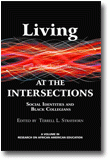
Living at the Intersections
Social Identities and Black Collegians
Edited by:
Terrell L. Strayhorn, Virginia Union University
A volume in the series: Research on African American Education. Editor(s): Carol Camp Yeakey, Washington University, St. Louis. Rowhea Medhat Elmesky, Washington University in St. Louis. Bronwyn Nichols Lodato, Washington University in St. Louis.
Published 2013
Living at the Intersections: Social Identities and Black Collegians brings together 21 diverse authors from 14 different institutions, including our nation’s most prestigious public and private universities, to advance the use of intersectionality and intersectional approaches in studying Black students in higher education.
Chapters cover a diversity of topics, ranging from spirituality to sexuality and masculinity, from Black students at HBCUs to those in STEM majors, and a host of issues related to race, class, gender, and other identities. Authors draw upon a wealth of data including national surveys, interviews, focus groups, narratives, and even historical research. A smooth blend of anthropology, historiography, psychology, sociology, and intersectional approaches from multiple disciplines, this book breaks new ground on the “who, what, when, where, and how” of intersectionality applied to social problems affecting Black collegians. The authors go beyond merely stating the importance of intersectionality in research, but they also provide countless examples, recommended strategies, and tools for doing so. This book is an important resource for higher education and student affairs professionals, scholars, and graduate students interested in intersectionality and Black collegians.
CONTENTS
Introduction, Terrell L. Strayhorn. Black Students in Physics: The Intersection of Academic Ability, Race, Gender, and Class, Sharon Fries-Britt, Jennifer Johnson, and Brian Burt. Many Into One: Using Intersectional Perspectives to Understand Black First-Generation College Student Identities, Rachelle Winkle-Wagner and Dorian McCoy. “All I Got is You”: Exploring the Intersectionality of Low-Income Black Males’ Educational Challenges at HBCUs, Robert T. Palmer and Jameel Scott. Black Doctoral Students Intersections: Issues of Race, Class, and Gender, Tonya N. Saddle, Eugene Kelly, and Terrell L. Strayhorn. Complicating Belief: Intersectionality and Black College Students’ Spirituality, Dafina Lazarus Stewart. Things Hoped For: Using Intersectionality to Understand Black Students’ Aspirations, Terrell L. Strayhorn. Black College Women and Intersectionality: Examining and Interweaving Core Concepts and Themes, Charmaine L. Wijeyesinghe and Susan R. Jones. (Un)Doing Homogeneity in Qualitative Research: Exploring Manhood Among African American Male Collegians, T. Elon Dancy II. Promoting Black Student Success: The Implications of Intersectionality and Multiple Identities on Perceptions of Racial Climate, Cheryl A. Brown and Uma Jayakumar. Looking Beyond Labels: Black Honors Students Negotiating the Intersections Between Their Personal and Social Identities, Kimberly A. Griffin and David Perez II. Black Undergraduates at Historically Black Colleges and Universities and Multiple Identities, Marybeth Gasman, Thai-Huy Nguyen, and Sadia Kalam. When and Where Race and Sexuality Collide With Other Social Locations: Studying the Intersectional Lives of Black Gay Men in College, Terrell L. Strayhorn and Derrick L. Tillman-Kelly. Mentoring at the Intersections: A Doctoral Student’s Narrative, Michael Steven Williams. Conclusion: Future Directions and Applications of Intersectionality to Higher Education, Terrell L. Strayhorn. Appendix: Suggested Readings. About the Authors.
-
Paperback9781623961473
Web price: $45.04 (Reg. 52.99)
-
Hardcover9781623961480
Web price: $80.74 (Reg. 94.99)
- eBook9781623961497

- EDU037000 - EDUCATION: Research
- EDU001000 - EDUCATION: ADMINISTRATION: General
- EDU015000 - EDUCATION: Higher
-
 Cultural Capital and Black Education
African American Communities and the Funding of Black
Cultural Capital and Black Education
African American Communities and the Funding of Black
-
 From Disagreement to Discourse
A Chronicle of Controversies in Schooling and Education
From Disagreement to Discourse
A Chronicle of Controversies in Schooling and Education
-
 Shuttered Schools
Race, Community, and School Closures in American Cities
Shuttered Schools
Race, Community, and School Closures in American Cities
-
 Surmounting all Odds - Vol. 1&2
Equalizing Education Opportunities in the New Millennium (Vol 1 & 2)
Surmounting all Odds - Vol. 1&2
Equalizing Education Opportunities in the New Millennium (Vol 1 & 2)
-
 The Broken Cisterns of African American Education
Academic Performance and Achievement in the Post-Brown Era
The Broken Cisterns of African American Education
Academic Performance and Achievement in the Post-Brown Era
-
 Towards a Brighter Tomorrow
The College Barriers, Hopes and Plans of Black, Latino/a and Asian American Students in California
Towards a Brighter Tomorrow
The College Barriers, Hopes and Plans of Black, Latino/a and Asian American Students in California
-
 Using Past as Prologue
Contemporary Perspectives on African American Educational History
Using Past as Prologue
Contemporary Perspectives on African American Educational History

